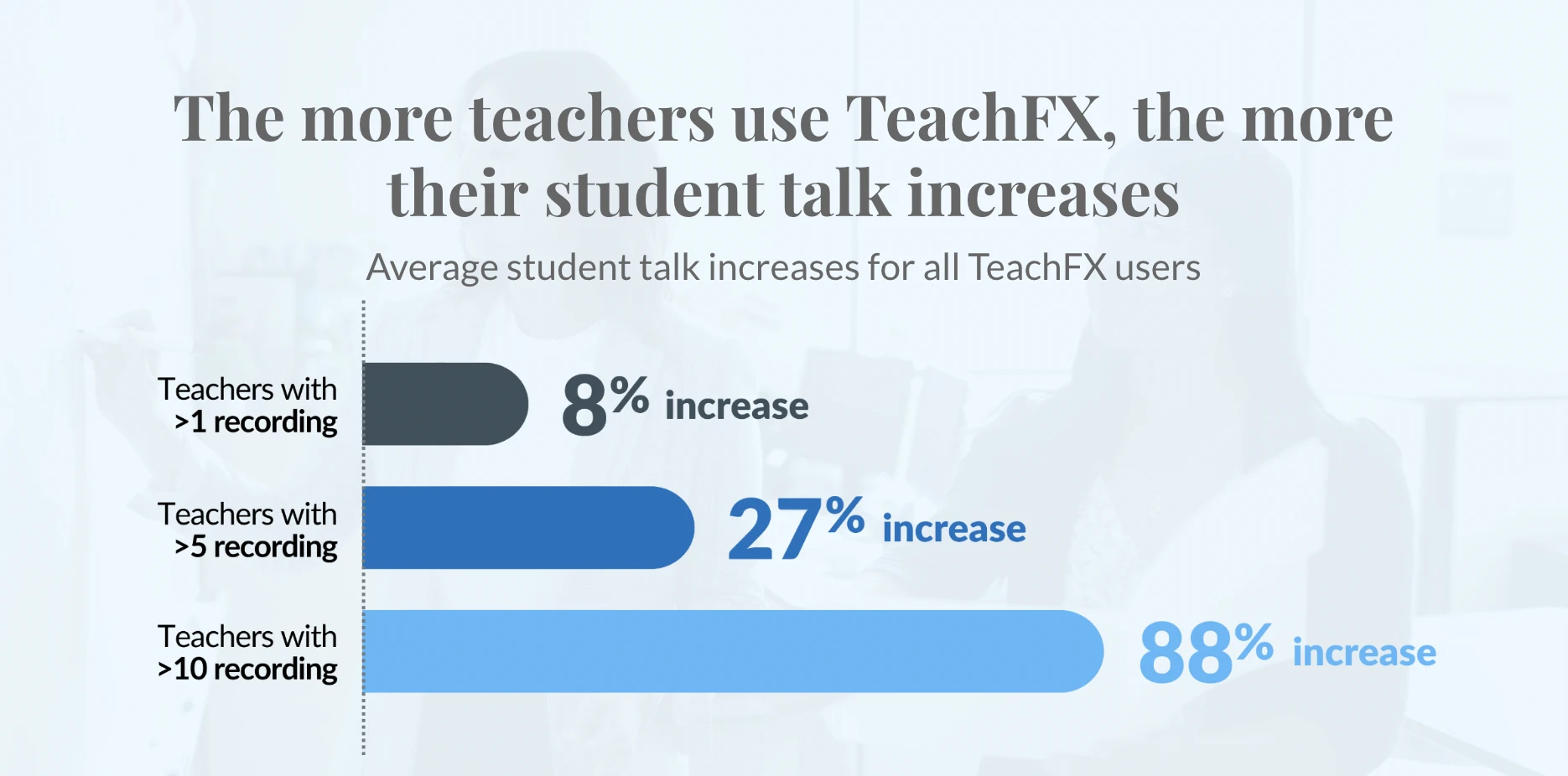
Webinar: How TeachFX is Superpowering Instructional Coaching with AI
The most effective and fastest way to improve outcomes for kids is to support teachers in improving teaching practice.
Coaching and feedback together form the most reliable path to helping teachers improve their practice; and that teachers both need and appreciate that feedback.
However, research also shows that the feedback teachers receive can too often feel subjective or evaluative. For many teachers, feedback is received rarely if ever. And even when coaching is available, it’s not always accessible frequently enough.
AI-generated instructional feedback can supercharge the impact of instructional coaching on teacher practice and student learning.
In this webinar, our panelists shared from the research and their own direct experiences as teachers and instructional coaches, practices for engaging teachers in instructional coaching, building trust with teachers, and utilizing AI-powered instructional feedback from TeachFX to help coaches make the most of every coaching moment.
About the Panelists

Heather C. Hill, Ph.D.
Harvard Graduate School of Education
Heather C. Hill is the Hazen-Nicoli Professor of Teacher Learning and Practice at the Harvard Graduate School of Education, specializing in teacher quality and policy research. She's a fellow at the American Educational Research Association, serves on several journal editorial boards, and advises on various education research projects worldwide.

Alyssa Van Camp, Ph.D.
Head of Research, TeachFX
Alyssa is a former 4th-grade teacher and mathematics interventionist. Holding a B.S. in Elementary Education & Child Studies, an M.Ed. in International Education Policy & Management, and a Ph.D. in Special Education, Alyssa has devoted her career to enhancing educational opportunities for underserved student populations. Prior to TeachFX, Alyssa completed a Ph.D. focused on applying emerging technologies to develop interventions that improve teachers' practices.

Bruce Herring
Community & Content Manager, TeachFX
Bruce received his B.A. in Psychology and Sociology from the University of Kentucky and M.A. Teaching from Louisiana Christian University (formery Louisiana College). With more than 10 years of experience as a science teacher and STEM instructional coach, he is passionate about helping students of color see themselves as the next generation of scientists and engineers.
Regular Coaching and Feedback Reliably Help Teachers Change Teaching Practice
TNTP’s research finds almost no clear patterns about what really helps teachers grow – except for one. Teachers who receive objective and regular coaching show consistent improvements in their teaching practice over time. They're more open to pursuing improvements in their practice and they're more likely to show improvements, regardless of where they are in their career.
Teachers who have access to regular coaching grow their confidence in their teaching abilities and improve student engagement in their classrooms.
As a researcher focused on how to improve instruction, improve experiences for kids in the classroom, and improve students’ outcomes in terms of both academics and belonging and well-being, Heather C. Hill’s research has consistently found coaching to be one of the most promising activities that teachers and schools can engage in.
Intensive coaching programs have been found to boost teachers’ classroom practice by 20 percentile points, and to increase participating students’ performance as compared with students in classrooms where teachers were not coached.
Engaging Teachers in the Coaching Process
Impactful coaching often hinges on nurturing our teachers’ growth mindsets.
As a coach, it’s important to help teachers not only choose to participate in coaching, but also fully engage in the process by being open to feedback and reflection.
Help teachers see the why behind the coaching.
As an instructional coach, Bruce took it upon himself to make school-wide instructional goals and high-level instructional visions make sense for his teachers.
When receiving a coach’s feedback, teachers need to know what rubrics we’re using and how those rubrics help them grow.
Teachers need to see how coaching fits into the overall instructional goals for their school.
Heather noted in her review of the literature, whenever a study says that a certain mode of professional development didn't work, the reason is almost always that the professional development didn't fit into the goals of the school.
It's almost always the leadership wasn't on board, or wasn't even aware. And so the mode of PD being studies was just one of too many other, disconnected things that teachers were being asked to do.
This is true also of coaching. There's a few studies that explicitly say: when coaching programs work, it’s in schools where principals got on board and messaged and helped the coach do their work. And when coaching programs don’t work, that instructional leadership alignment just isn’t there.
Personalize the coaching experience to each teacher’s specific needs.
This is essential. One of the most important starting points in establishing a good coaching relationship is making sure that the support we’re providing is grounded in the unique pain points that that teacher is experiencing in that moment in their classroom.
What would the teacher would like to do? And how can you, as coach, both help the teacher identify areas of need and help them make progress in those areas?
We need to use our coaching moments to address the big, pressing challenges our teachers are facing. Otherwise, it can be hard for teachers to feel motivated to engage fully in the coaching process.
Every teacher is different, just like every student is different. They need different types and levels of support.
We have to get to know each teacher, really understand their classrooms, spend time in those classrooms and see for ourselves what's happening.
When we put in that time and effort to individualize the coaching experience, teachers feel open to articulate what they really would like help with, and how their coaches can help them accomplish those goals over time.
That’s how we create a cycle that makes the teacher want to come back and continue to participate in coaching, and feel supported in a way that allows them to truly, really grow in their practice and accomplish those goals.
The teacher and coach need to work in partnership.
The coach and teacher must collaborate, as partners.
Create goals together. And, create together bite-sized, actionable steps that you, as a teacher-coach team, can take in order to help the teacher accomplish their goals. Ideally, this starts with the first or second coaching session of the year.
This way, the teacher and the coach see the same developmental roadmap for the year. And you keep each other moving in the same direction.
Build trust to create space for vulnerability.
Instructional coaching is a delicate process. You’re asking teachers to be open to identifying, with you, their own growth opportunities – and to receiving feedback from you on how they’re progressing.
If you’re teaching in the classroom, you can start by modeling the sort of self-reflection and openness to feedback that you’d like your teachers to practice.
For example: as a coach who’s also teaching in the classroom, Dr. Diana Torres Rivera recorded her own teaching using TeachFX, and talked with her teachers about her own reflections on what the app’s insights showed her about her teaching.
By doing so, Diana modeled for teachers being open to feedback – and demonstrated her own willingness to do so.
When Diana invited her teachers to try TeachFX for themselves, she found that the they were ready and open to self-reflecting on their TeachFX insights – as well as bringing that into their coaching meetings.
Be consistent in the frequency and ways that you provide coaching and feedback.
To be helpful for teachers, feedback needs to be consistent, it needs to happen regularly, and it needs to fit into a routine that is predictable.
The research reaches more broadly than just coaching. In general, humans really like routines and consistency.
In coaching, the research supports that it’s important for teachers to know what to expect in terms of the feedback that they're going to get, the kinds of conversation that they're going to have with the coach, and the outcomes.
This sets the stage for teachers to really be able to engage in the process. And, it’s helpful for coaches. It gives coaches a structure and a focus to follow.
It may sound simple, but being clear about how often a teacher can expect to receive coaching is important.
We can do this by clearly specifying those conversational routines involved, like reflection, agency, planning, and using a rubric to analyze your own practice.
When we reinforce that over and over with teachers, it seems to have an impact on how they are able to improve student outcomes.
Consider whether teachers know what to expect out of a coaching session – Is this a formal evaluation, or an informal one? What’s the structure of a coaching conversation? What do we do when we meet? What do I walk away with? Research supports that teachers appreciate and need consistent feedback.
Coaches Are Stretched Thin, Making it Challenging to Provide Coaching and Feedback Reliably or Frequently
In fact, 61% of the teachers who find coaching really valuable meet with their coaches at least bi-weekly. But, the reality is that fewer than half of teachers are actually able to meet with their coach that frequently.
There are so many reasons why it can seem nearly impossible for an instructional coach or school-based staff member who's supporting teachers to be that consistent in providing that kind of feedback to teachers. And research validates this.
Coaches are teaching in the classroom (40% of school-based instructional coaches do, according to Digital Promise). They may be an interventionist working directly with students in other capacities, and they're often supporting large caseloads of teachers at one time. Many school- and district-based instructional coaches are working with 16 or more teachers at a time.
AI Can Help Get Teachers the Feedback They Need, and Make the Most of Each Coaching Moment
As a fourth-grade teacher in Nashville, Tennessee, the only time TeachFX Head of Research Alyssa Van Camp had someone else observe her teaching and give her feedback was for her formal teacher evaluation.
Even then, the feedback she received wasn't specific enough to help her understand how she could use that information to grow her teaching practice. And it wasn’t timely enough to help her really understand how to support the students in her classroom that year.
Alyssa’s story is all too common. TeachFX founder Jamie Poskin has a similar story, having never been observed once in all the time he spent in the classroom.
And on the flip side of this equation, we've heard all too often of coaches trying to gather the insights they need manually. Have you ever found yourself sitting back in the back of the classroom, trying to write down every question a teacher asks or using your phone to keep track of student talk time? And while you’re focused on that, you’re not focused on being present in the room.
This is where AI-generated instructional feedback comes in. TeachFX puts AI-powered instructional feedback in the hands of teachers and coaches.
With AI, the TeachFX app can gather for you automatically the data that used to be impossible.
And, teachers can gather their own feedback when and as often as they would like.
AI-generated instructional feedback meets the standards for impactful feedback
The research defines several qualities necessary for instructional feedback to be effective in changing teacher practice.
it is not evaluative
it's objective
the focus remains on instruction
it's given by somebody who is trusted
The instructional feedback that’s produced by the TeachFX app meets all of these criteria.
Because the feedback is generated by AI, it’s clearly objective and not evaluative. It’s not a person’s subjective or limited opinion of a given moment.
The feedback is focused solely on the instructional practices the AI is trained to identify. For instance, TeachFX provides insights into the extent to which teachers take up student contributions, which is just at the core of instruction.
Teachers can gather the feedback themselves. Or, when a coach is utilizing the app, both coach and teacher have access to the same information.
Heather Hill and Dora Demszky have studied how this feedback impacts teaching and learning in math and science classrooms, most recently with 100 teachers in Utah.
And we’ve found that the more teachers use TeachFX, the more their student talk increases.

Making the Most of Every Coaching Moment
Incorporating AI-generated instructional feedback into the instructional coaching process helps both coach and teacher make the most of every coaching moment.
Sitting on the same side of the table with classroom-level data
Coaches who use TeachFX find that having objective, AI-generated feedback can really change the coaching process and the conversation that happens between coaches and teachers.
With TeachFX, teachers can gather and reflect on feedback, without waiting for classroom observations. By reflecting on their own data, on their own, the come to coaching having set an intention.
And, when coaches and teachers are actually sitting on the same side of the table together, looking at the same classroom-level data, the conversation changes. It shifts from: ‘This is what I saw in your classroom’ to instead being, ‘this is what I saw in my classroom, and this is what I'd like you to help me with as my coach.’
Scaffolding the coaching process with one insight at a time
Effective coaching can adopt a scaffolded lesson planning process, much like teachers might in their own classrooms. You might say: ‘Okay, so you're working on taking up student contributions. Let's look at your next lesson. Let's think about how you can integrate that into your next lesson.’
That process is superpowered by the AI-generated feedback teachers and coaches can get from TeachFX. You can actually look at the first lesson and utilize data to choose what to focus on. And then, look at the next lesson and say, ‘Oh, wow! That was pretty amazing, you improved on that by quite a bit.’
TeachFX insights cover a wealth of different instructional practices and student outcomes that are tied to those practices,
So, especially when teachers are getting started with the ability to gather this much feedback, as frequently as they like, it’s helpful to choose one high-leverage practice they'd like to get better at. Focus on improving that over time.
That way, when they dive into their class report with so much information available, they can choose to zoom right in on the practice that they're really focused on.
For instance, you might zoom in on when they asked questions that got kids talking; the ones that resulted in long stretches of student engagement. And that might lead to talking to them about other questions they asked, perhaps ones that didn't generate a ton of student talk. That can be a foundation to talk about how they can grow their practice the next day with their students.
And then over time, as they grow in that practice and really start mastering it, your coaching can encourage them to move to other practices that they could grow in.
TeachFX is On a Mission to Superpower Every Instructional Coach’s Impact
In a moment when coaches are spread so thin and your role is so challenging, AI-powered instructional feedback truly can superpower the impact each coach can have on teaching practice.
If you’d like to help your teachers engage more actively in instructional coaching, gather and reflect on their own instructional feedback, and collaborate with you in partnership, we’d love to help you give TeachFX a try.
Administrators & Coaches
Classroom Teachers
Guest user

